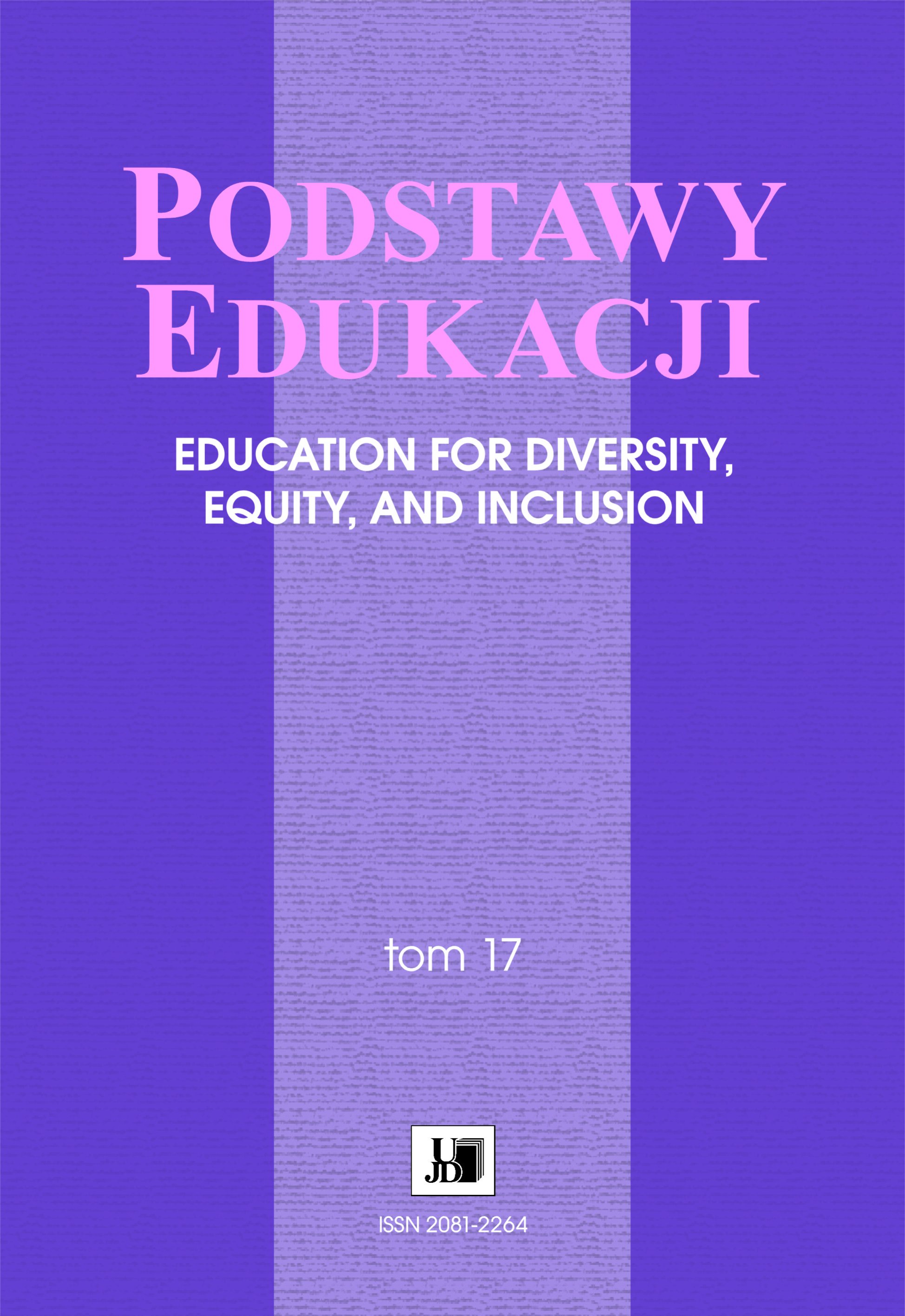Abstrakt
Środowisko szkolne jest najczęściej analizowane z punktu widzenia dorosłych. Niniejsze badanie ukazuje różne aspekty życia szkolnego z perspektywy uczniów w ujęciu aktualnym i preferowanym (pominięto percepcję nauczycieli), którzy stykają się z różnymi sytuacjami występującymi w środowisku szkolnym. Badanie przeprowadzono wśród 1195 uczniów uczęszczających do szkoły podstawowej – od 4 do 8 klasy. Narzędziem badawczym był kwestionariusz TROFLEI (Technology-Rich Outcomes-Focused Learning Environment Inventory). Badanie pozwoliło na identyfikację tych aspektów szkolnej codzienności, które są dla uczniów najważniejsze. Wyniki badania sugerują zmianę metod i stylów nauczania w polskiej szkole, a także odejście od schematycznego podejścia, zwrócenie uwagi na rozwój osobisty ucznia i relacje interpersonalne między uczniami oraz między uczniami a nauczycielami. Wszystko to stanowi niezbędny warunek tworzenia przyjaznej atmosfery w szkole i warunkuje pomyślną realizację jej funkcji.
Bibliografia
Afari, E., Aldridge, J.M., Fraser, B.J., Khine, M.S. (2013). Students’ perceptions of the learning environmentand attitudes in game-based mathematics classrooms. Learning Environments Res, 16, 131–150. https://dx.doi.org/10.1007/s10984-012-9122-6.
Aldridge, J.M., Fraser, B.J. (2008). Outcomes-focused learning environments: Determinants and effects. Leiden – Boston: Brill.
Aldridge, J.M., Dorman, J.P., Fraser, B.J. (2004). The use of multitrait-multimethod modelling to validate actual and preferred forms of the Technology-Rich Outcomes-Focused Learning Environment Inventory (TROFLEI). Australian Journal of Educational and Developmental Psychology, 4, 110–125.
Aldridge, J.M., Bianchet, S. (2022). Using student feedback about the learning environment as a starting point for co-construction. Learning Environment Research, 25, 939–955. https://dx.doi.org/10.1007/s10984-021-09403-9.
Brozmanová, M., Kosová, B. (2022). Consequences of National Testing of Primary School Pupils Through the Eyes of Teachers. The New Educational Review, 70, 71–81. https://cejsh.icm.edu.pl/cejsh/element/bwmeta1.element.ojs-doi-10_15804_tner_2022_70_4_06.
Closs, L., Mahat, M., Imms, W. (2022). Learning Environments influence students’ learning experience in the Australian Faculty of Business and Economics. LearningEnvironment Research, 25, 271–285. https://dx.doi.org/10.1007/s10984-021-09361-2.
Day, Ch. (1999). Developing Teachers: The Challenges of Lifelong Learning. London: Routledge.
Dorina R. (2013). School Climate as an Important Component in School Effectiveness. Academicus International Scientific Journal 8(8), 110–125. https://dx.doi.org/10.7336/academicus.2013.08.06.
Dorman, J.P., Fraser, B.J. (2009). Psychosocial environment and affective outcomes in technology-rich classrooms: testing a causal model, Social Psychology of Education, 12(1), 77–99. https://dx.doi.org/10.1007/s11218-008-9069-8.
Jagieła, J. (2023). Psychopedagogika relacji. Analiza transakcyjna dla nauczycieli i wychowawców. Warszawa: Difin.
Jagieła, J. (2009). Kryzys w szkole. Krótki poradnik psychologiczny. Kraków: Rubikon.
Khalil, N., Aldridge, J. (2019). Assessing students’ perceptions of their learning environment in science classes in the United Arab Emirates. Learning Environment Research, 22, 365–386. https://dx.doi.org/10.1007/s10984-019-09279-w.
Kulesza, M. (2011). Klimat szkoły a zachowania agresywne i przemocowe uczniów. Łódź: Wydawnictwo Uniwersytetu Łódzkiego.
Lombardi, E., Traficante, D., Bettoni, R., Offredi, I., Giorgetti, M., Vernice, M. (2019) The Impact of School Climate on Well-Being Experience and School Engagement: A Study With High-School Students. Frontiers in Psychology, 10. https://dx.doi.org/10.3389/fpsyg.2019.02482.
Maxwell, S., Reynolds, K.J., Lee E., Subasic E., Bromhead, D. (2017) The Impact of School Climate and School Identification on Academic Achievement: Multilevel Modeling with Student and Teacher Data. Frontiers in Psychology, 8. https://dx.doi.org/10.3389/fpsyg.2017.02069.
Molinari, L., Grazia, V. (2023). Students’ school climate perceptions: do engagement and burnout matter? Learning Environment Research, 26, 1–18. https://dx.doi.org/10.1007/s10984-021-09384-9.
OECD (2013), PISA 2012 Results: What Makes Schools Successful? Resources, Policies and Practices (Volume IV). OECD Publishing. http://dx.doi.org/10.1787/9789264201156-en.
OECD (2019). PISA 2018. Results (Volume III): What School Life Means for Students’ Lives. OECD Publishing, Paris. https://doi.org/10.1787/acd78851-en.
OECD (2023), "Schools as hubs for social and emotional learning: Are schools and teachers ready?", OECD Education Spotlights, No. 4, OECD Publishing, Paris. https://doi.org/10.1787/f6d12db7-en.
Ostaszewski, K. (2012). Pojęcie klimatu szkoły w badaniach zachowań ryzykownych młodzieży. Edukacja, 4(120), 23–38. https://www.cen.lomza.pl/files/badania_raporty/36300417/lib/Pojecie-klimatu-szkoly.pdf. [access: 12.03.23].
Piasecka, M. (2015). Środowiskowe ograniczanie czynników ryzyka uzależnienia młodzieży szkolnej od substancji psychoaktywnych. Kraków: Wydawnictwo Ignatianum.
Przewłocka, J. (2015). Klimat szkoły i jego znaczenie dla funkcjonowania uczniów w szkole. Raport o stanie badań. Warszawa: IBE.
Rusticus, S.A., Wilson, D., Jarus, T., O’Flynn-Magee, K., Simon, A. (2022) Exploring student perceptions of the learning environment in four health professions education programs. Learning Environment Research, 25, 59–73. http://dx.doi.org/10.1007/s10984-021-09349-y.
Sattler, D.N., Gruman, D.H., Enkhtur, O., Muskavage, B., Bishkhorloo, B. (2022). School climate in Mongolia: Translation and validation of the What is Happening in This School. Learning Environment Research, 25, 325–340. http://dx.doi.org/10.1007/s10984-021-09375-w.
Szymański, M.J. (2014). Problematyka codzienności w badaniach społecznych i pedagogicznych. In: E. Bochno, I. Nowosad, M. Szymański (eds.), Codzienność szkoły. Uczeń (pp. 9-25). Kraków: Wydawnictwo Impuls.
Thapa, A., Cohen, J., Guffey, S., Higgins-D’Alessandro, A. (2013). A Review of School Climate Research. Review of Educational Research, 83(3), 357–385. http://dx.doi.org/10.3102/0034654313483907.
Tubbs, J.E., Garner, M. (2008). The Impact Of School Climate On School Outcomes. Journal of College Teaching & Learning (TLC), 5(9). http://dx.doi.org/10.19030/tlc.v5i9.1230.
UNICEF Poland (2019). Children’s rights from the perspective of children, parents and teachers. Research report. UNICEF Poland.
Welch, A.G., Cakir, M., Peterson, C.M., Ray C.M. (2014). The relationship between gender and classroom environment in Turkish science classrooms, Educational Research and Reviews, 9(20), 893–903. https://doi.org/10.5897/ERR2014.1839.
Welsh, W.N. (2000). The Effects of School Climate on School Disorder. The ANNALS of the American Academy of Political and Social Science, 567(1), 88–107. http://dx.doi.org/10.1177/000271620056700107.
Zullig, K.J., Huebner, E.S. & Patton, J.M. (2011). Relationships among school climate domains and school satisfaction. Psychology In the Schools, 48(2), 132–145. https://dx.doi.org/10.1002/pits.20532.
Wysocka, E., Tomiczek, K. (2014). Szkoła jako środowisko życia i codzienność ucznia – analiza teoretyczna i empiryczne egzemplifikacje percepcji i sposobu wartościowania szkoły przez uczniów. Przegląd Pedagogiczny, 1, 169–188, https://cejsh.icm.edu.pl/cejsh/element/bwmeta1.element.desklight-ac09f417-99a8-47c9-803d-96134f40a60a [access: 22.02.24].

Utwór dostępny jest na licencji Creative Commons Uznanie autorstwa 4.0 Międzynarodowe.
Prawa autorskie (c) 2024 Beata Jakimiuk
